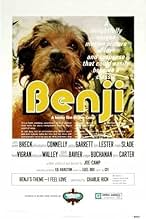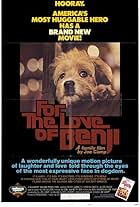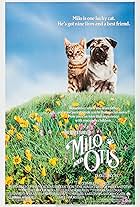IMDb RATING
6.1/10
5.3K
YOUR RATING
A stray dog saves two kidnapped children.A stray dog saves two kidnapped children.A stray dog saves two kidnapped children.
- Nominated for 1 Oscar
- 1 win & 2 nominations total
- Director
- Writer
- All cast & crew
- Production, box office & more at IMDbPro
Storyline
Did you know
- TriviaThis film was apparently a guilty pleasure of Alfred Hitchcock.
- GoofsWhen the white dog "Tiffany" comes to the abandoned house for the first time, as she is climbing into the house, you can see a crew member down below spotting her as she climbs onto a high rail.
- Crazy creditsThe final picture of Benji, after the end credits, shows the caption, "Woof."
- ConnectionsEdited into Doggiewoggiez! Poochiewoochiez! (2012)
- SoundtracksBenji's Theme (I Feel Love)
Music by Euel Box
Lyrics by Euel Box and Betty E. Box
Performed by Charlie Rich
Featured review
Although I did initially see Benji as a kid in 1974, I want to talk about some interesting facets of the film for adults instead.
Just a brief comment on showing the film to kids, though. It's probably going to be more of a gamble at this point in time for kids to watch Benji. There's a chance that older kids will be bored by the pacing, content, and general lack of humor. They'll probably hate the music, too. For younger kids (say, maybe 8 or younger), there's a better chance that they'll be entertained merely by seeing cute dogs do unusual things and also that they'll identify with the two child stars, who are about their age. But during the climax of the film, there is some more intense material (at least the ideas involved--the actual images are relatively tame) that may disturb some children.
I think that Benji is probably a safer gamble for adults at this point in time, but you have to approach it in a particular way, not necessarily approaching it either nostalgically or as a kid's film. Viewing Benji at this point in time, it played as a dog's film, told from a dog's perspective. While this is not the only film to tell a story from an animal's perspective, producer/writer/director Joe Camp does something unusual in that he plays things mostly seriously and realistically. There is a bit of tongue in cheek-ness to the whole affair--and one section that is a very funny outright spoof of late 1960s/early 1970s romance films, and the events are idealized slightly in a way that we might imagine a dog to idealize them, but overall, Benji is played straight, not for laughs or melodrama.
That fact is the cause of some unusual structural properties. Dogs' lives tend to be far more routine than humans' lives. Benji, as extraordinary as his life happens to be, is no exception. He's a stray who has a long daily routine that involves visiting various friendly people to obtain food. So the first half hour of the film sees Benji, from his perspective with a few third person omniscient intrusions, cycle through his daily routine two times.
On the third run-through, things begin to get more dramatic as his routine is broken up slightly--both in a positive way when he finds a girlfriend by the way of a Maltese and in a negative way when some shady characters intrude into his otherwise abandoned home. Although I agree that an interesting, entertaining film could have been made out of just showing Benji go through his routine, that would have been relatively avant-garde, and Camp maybe decided that his dog-perspective film was unusual enough already, so the principal story turns out to be these intrusions which set up more classical dramatic conflicts.
And Camp did a fine job of designing the film in the way he did. The climax works as well as it does only because he has taken us through Benji's lengthy daily routine a couple times. The climax and the build-up to the climax hinge on Benji hurriedly traveling his circuitous daily route a couple more times, and what pushes the events over the edge to success is that Benji has to strain to think more like a human.
I wouldn't have picked up on any of these things seeing the film as a preteen in 1974. But they are there, and for adults, this is an entertaining film as much for its unusualness as for any other reason--you just have to watch it with this in mind. This is what films might be like if dogs made them. And if you decide to show Benji to your children and explain these unusual qualities to them, you might just find it a more enjoyable experience for both of you.
Just a brief comment on showing the film to kids, though. It's probably going to be more of a gamble at this point in time for kids to watch Benji. There's a chance that older kids will be bored by the pacing, content, and general lack of humor. They'll probably hate the music, too. For younger kids (say, maybe 8 or younger), there's a better chance that they'll be entertained merely by seeing cute dogs do unusual things and also that they'll identify with the two child stars, who are about their age. But during the climax of the film, there is some more intense material (at least the ideas involved--the actual images are relatively tame) that may disturb some children.
I think that Benji is probably a safer gamble for adults at this point in time, but you have to approach it in a particular way, not necessarily approaching it either nostalgically or as a kid's film. Viewing Benji at this point in time, it played as a dog's film, told from a dog's perspective. While this is not the only film to tell a story from an animal's perspective, producer/writer/director Joe Camp does something unusual in that he plays things mostly seriously and realistically. There is a bit of tongue in cheek-ness to the whole affair--and one section that is a very funny outright spoof of late 1960s/early 1970s romance films, and the events are idealized slightly in a way that we might imagine a dog to idealize them, but overall, Benji is played straight, not for laughs or melodrama.
That fact is the cause of some unusual structural properties. Dogs' lives tend to be far more routine than humans' lives. Benji, as extraordinary as his life happens to be, is no exception. He's a stray who has a long daily routine that involves visiting various friendly people to obtain food. So the first half hour of the film sees Benji, from his perspective with a few third person omniscient intrusions, cycle through his daily routine two times.
On the third run-through, things begin to get more dramatic as his routine is broken up slightly--both in a positive way when he finds a girlfriend by the way of a Maltese and in a negative way when some shady characters intrude into his otherwise abandoned home. Although I agree that an interesting, entertaining film could have been made out of just showing Benji go through his routine, that would have been relatively avant-garde, and Camp maybe decided that his dog-perspective film was unusual enough already, so the principal story turns out to be these intrusions which set up more classical dramatic conflicts.
And Camp did a fine job of designing the film in the way he did. The climax works as well as it does only because he has taken us through Benji's lengthy daily routine a couple times. The climax and the build-up to the climax hinge on Benji hurriedly traveling his circuitous daily route a couple more times, and what pushes the events over the edge to success is that Benji has to strain to think more like a human.
I wouldn't have picked up on any of these things seeing the film as a preteen in 1974. But they are there, and for adults, this is an entertaining film as much for its unusualness as for any other reason--you just have to watch it with this in mind. This is what films might be like if dogs made them. And if you decide to show Benji to your children and explain these unusual qualities to them, you might just find it a more enjoyable experience for both of you.
- BrandtSponseller
- Jul 8, 2006
- Permalink
- How long is Benji?Powered by Alexa
Details
- Release date
- Country of origin
- Language
- Also known as
- Benji - Auf heißer Fährte
- Filming locations
- Production company
- See more company credits at IMDbPro
Box office
- Budget
- $500,000 (estimated)
- Gross US & Canada
- $39,552,000
- Gross worldwide
- $39,552,000
Contribute to this page
Suggest an edit or add missing content


































